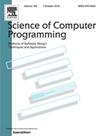基于SSCalc的可靠智能合约的演绎验证
IF 1.4
4区 计算机科学
Q3 COMPUTER SCIENCE, SOFTWARE ENGINEERING
引用次数: 0
摘要
智能合约是存储在区块链上的程序,通常用高级编程语言开发,其中最流行的是Solidity。智能合约用于自动化金融交易,因此错误可能导致巨大的经济损失。在本文中,我们通过描述Isabelle/HOL中的Solidity验证环境来解决这个问题。为此,我们首先描述了一个关于Solidity智能合约的演算。在Isabelle/HOL中对微积分进行了形式化,并对其合理性进行了机械验证。然后,我们验证了一个定理,该定理保证任意契约类型的所有实例都满足相应的不变量。该定理可用于验证Solidity智能合约的不变量。这是通过一个案例研究来证明的,在这个案例研究中,我们使用我们的方法来验证在Solidity中实现的一个简单令牌。我们的结果表明,与直接从语义进行验证相比,该框架具有显著减少验证工作的潜力。本文章由计算机程序翻译,如有差异,请以英文原文为准。

Deductive verification of solidity smart contracts with SSCalc
Smart contracts are programs stored on the blockchain, often developed in a high-level programming language, the most popular of which is Solidity. Smart contracts are used to automate financial transactions and thus bugs can lead to large financial losses. With this paper, we address this problem by describing a verification environment for Solidity in Isabelle/HOL. To this end, we first describe a calculus to reason about Solidity smart contracts. The calculus is formalized in Isabelle/HOL and its soundness is mechanically verified. Then, we verify a theorem which guarantees that all instances of an arbitrary contract type satisfy a corresponding invariant. The theorem can be used to verify invariants for Solidity smart contracts. This is demonstrated by a case study in which we use our approach to verify a simple token implemented in Solidity. Our results show that the framework has the potential to significantly reduce the verification effort compared to verifying directly from the semantics.
求助全文
通过发布文献求助,成功后即可免费获取论文全文。
去求助
来源期刊

Science of Computer Programming
工程技术-计算机:软件工程
CiteScore
3.80
自引率
0.00%
发文量
76
审稿时长
67 days
期刊介绍:
Science of Computer Programming is dedicated to the distribution of research results in the areas of software systems development, use and maintenance, including the software aspects of hardware design.
The journal has a wide scope ranging from the many facets of methodological foundations to the details of technical issues andthe aspects of industrial practice.
The subjects of interest to SCP cover the entire spectrum of methods for the entire life cycle of software systems, including
• Requirements, specification, design, validation, verification, coding, testing, maintenance, metrics and renovation of software;
• Design, implementation and evaluation of programming languages;
• Programming environments, development tools, visualisation and animation;
• Management of the development process;
• Human factors in software, software for social interaction, software for social computing;
• Cyber physical systems, and software for the interaction between the physical and the machine;
• Software aspects of infrastructure services, system administration, and network management.
 求助内容:
求助内容: 应助结果提醒方式:
应助结果提醒方式:


